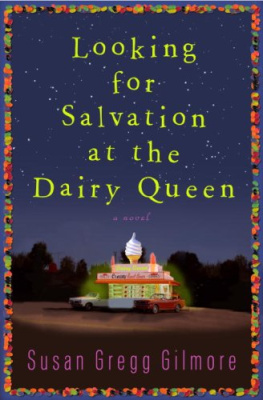O, be some other name!
W ILLIAM S HAKESPEARE ,
Romeo and Juliet
GROVE BABY GIRL MAKES DEBUT
FIFTH-GENERATION NASHVILLIAN
Friends and Family Celebrate at Grove Hill
Dr. and Mrs. Charles Goodman Grove V, of Nashville, welcomed their first child, born on March 26. The proud parents officially announced the birth of their daughter, Bezellia Louise, yesterday at a festive luncheon held at the familys Grove Hill estate.
More than one hundred friends and family enjoyed a lavish meal featuring lobster-style eggs Benedict, quiche Lorraine, and cheese strata. The tables were covered with pink damask and decorated with arrangements of pink and white sweetheart roses.
Mrs. Grove wore a one-piece, pale pink linen dress with a coordinating short-sleeved jacket detailed with a pink grosgrain ribbon. Her baby daughter was the center of attention wearing a smocked, white cotton gown accented with soft pink rosettes and trimmed with a pink satin ribbon. Dr. Grove gave his newborn daughter a strand of heirloom pearls, a necklace that was once worn by his great-grandmother.
Guests said the Groves were radiant as they introduced their infant daughter to Nashville society. Mr. and Mrs. George Madison Longfellow Hunt V, Dr. and Mrs. Richard S. Miller, Dr. and Mrs. Joseph Lawrence Hayes, of Birmingham, Ala., and Mr. and Mrs. Albert Lyle Patterson II, of Atlanta, Ga., were among those in attendance.
The Nashville Register
early edition
MAY 1, 1951

chapter one
A pparently among those who consider their social standing some measure of importance, I am to be admired, for I am one of the few Nashvillians who can claim with infallible certainty that a blood relation has lived in this town since its inception. My mother, although a Grove only by marriage, never tired of sharing this piece of family trivia at cocktail parties or morning coffees, convinced that it elevated her own social position far beyond what her birth parents could have guaranteed.
And whether or not she exaggerated the details of our familys history in the hope of impressing her friends, the truth remains that a poor Carolina farmer packed his bags some two hundred and fifty years ago and set out to cross the Appalachian Mountains, heading west with his young bride, determined to claim a few acres of his own and a better life for his family. He probably didnt have a penny to his name by the time he stumbled into Fort Nashborough begging for a hot meal and a place to sleep, but that doesnt seem to matter to the Grove family anymore.
Legend has it that when the Chickamauga Indians attacked the Nashville settlement, they killed my ancestral father as he fearlessly fought to protect his young wife. She grabbed the musket from her dying husbands hands and continued the fight, killing three Indian warriors herself. Then she fell on top of her husbands cold, bloody body and held him in her arms throughout the night.
Her name was Bezellia Louise, and for generations since, the first girl born to the eldest Grove male has been named in her memory. Although most official historians dispute any claims of her heroics, my father donated thousands of dollars to the Nashville Historical Society with the belief that eventually some fresh, young academic would see the past more according to my familys advantage. But whether fact or fiction, I have believed in her courage and passion and was always proud to share her name.
Sadly, the Bezellias birthed before me never cared for this designation, preferring a monosyllabic monikerlike Bee, Zee, or Zellto their formal Christian name. My own mother disliked it so much that for years she refused to let it cross her lips, calling me only Sister, a generic substitution that summed up her distaste for my name and her inadequate affection for me. I, on the other hand, always wanted to hear it in its entirety, never caring what others thought of it.
But long before I had memorized the details of my familys story, I understood that I was a girl unlike most others. I had a pony to ride and a closet brimming with neatly pressed dresses. My bedroom was decorated with teddy bears that were handmade in Germany and dolls with porcelain heads that I was only to admire and never to touch. And, most important, I was always cooked for and attended to by people other than my mother, by people with dark skin and families of their own.
Maizelle Cooper was a short, round woman with bits of white hair highlighting her forehead like a jeweled crown. She wore the same short-sleeved, light blue work dress every day, summer and winter. And she always kept a stiff white apron tied around her waist. When she hugged me and pressed my face into her full, round tummy, I could smell a faint perfume of flour and cinnamon and grease. Maizelle spent most of her time in the kitchen, keeping a careful watch over a collection of pots endlessly simmering on a hot black stove. She cooked buttery biscuits and sweet, creamy oatmeal to warm my stomach in the mornings and greeted me after school with a cold glass of milk and a piece of homemade pound cake.
She washed and ironed all of my clothes, even my undershirts, and prepared my baths in the evenings, and somewhere in between sang me songs about freedom and grace, swaying from one hip to the other as if the rhythm of her voice kept her body in perfect balance.
I asked her once why she sang those songs considering it had been almost a century since President Lincoln had signed the Emancipation Proclamation. Maizelle just shook her head and said that in all her years on this earth she had seen enough to know that there were many ways one man could make a slave out of another. Then she slowly wiped her brow and pointed to the crooked scar above her right eye. She never told me how it got there, and somehow I knew better than to ask. She imagined it was hard for me to understand all that she was saying from where I was standing, but the good Lord, she said, would make things right one day. She just hoped shed be here to see it.
Maizelle slept in the basement. Her bedroom was small and poorly lit. The gray stone walls always left it feeling cold and damp down there, no matter how hot the temperature was outside. It was furnished very simply, with a single bed, a chest of drawers, a small wooden chair, and a creaky old nightstand with a reading lamp on top. A toilet, sink, and shower spigot were set a few feet from her bedroom door with nothing but a heavy plastic curtain hanging from an old metal rod for privacy. Mother said that was all Maizelle needed, that she was here to work, not to lounge about. And if she didnt keep a close eye on her, then thats exactly what that woman would do. At least thats what Mother said.
I never asked Maizelle how she felt about living in the basement either. I guess I already knew the answer to that too. And even though I believed that she truly loved me, when she rode the bus home at the end of the week, I knew she loved her own family more.
Nathaniel Stephenson took care of the house, the grounds, and Mothers midnight blue Cadillac. He was a tall, lean man whose skin was so wonderfully rich and dark it looked like night, and when he smiled, his teeth shone like the stars in the Milky Way. His eyes were a deep brown but sprinkled with bits of emerald green. His mama said that the day he was born he had been kissed by an angel. Maybe. He was certainly one of the nicest men I ever knew, and definitely the strongest, and not just because I could see the muscles rippling beneath his cotton work shirt.












